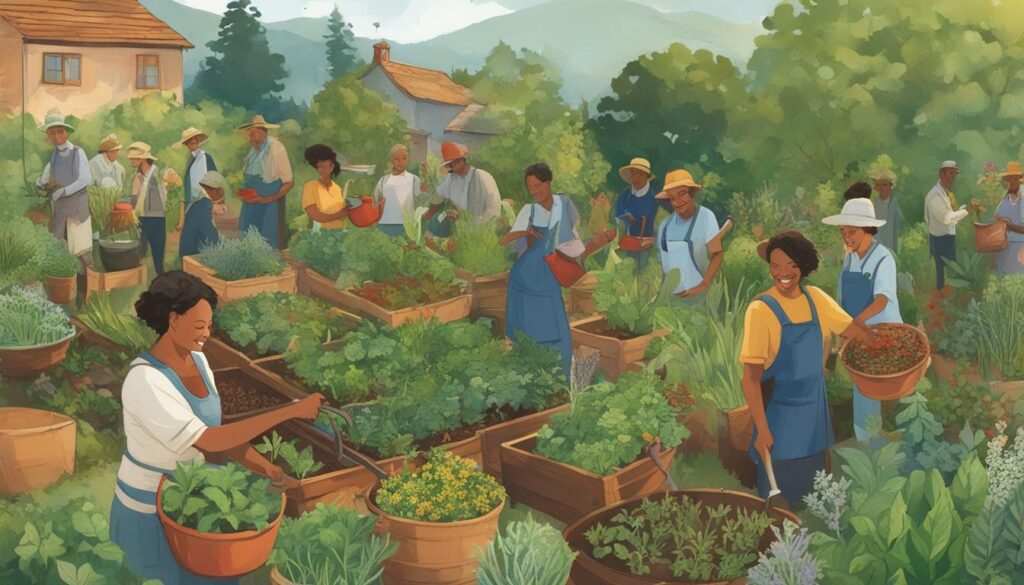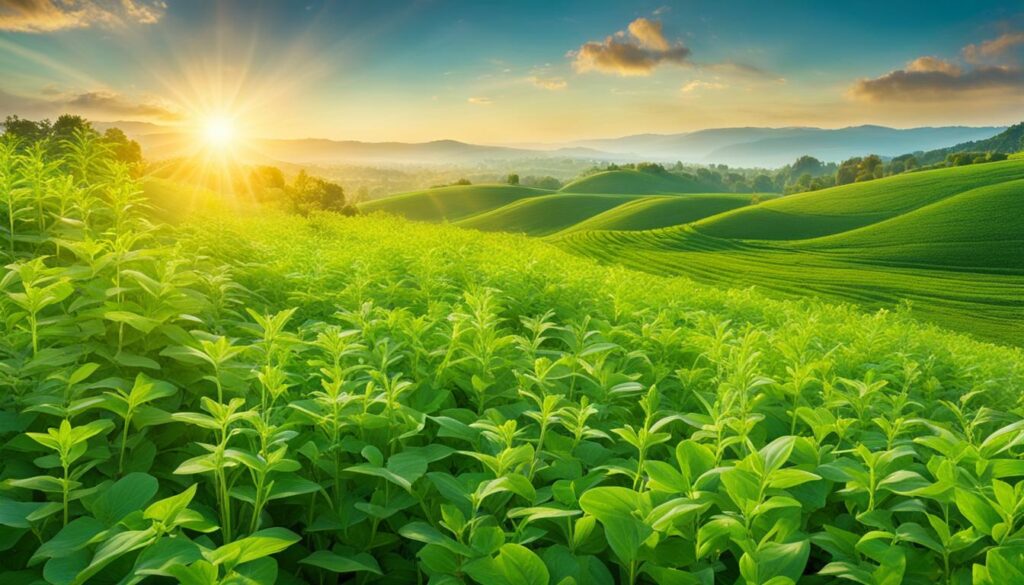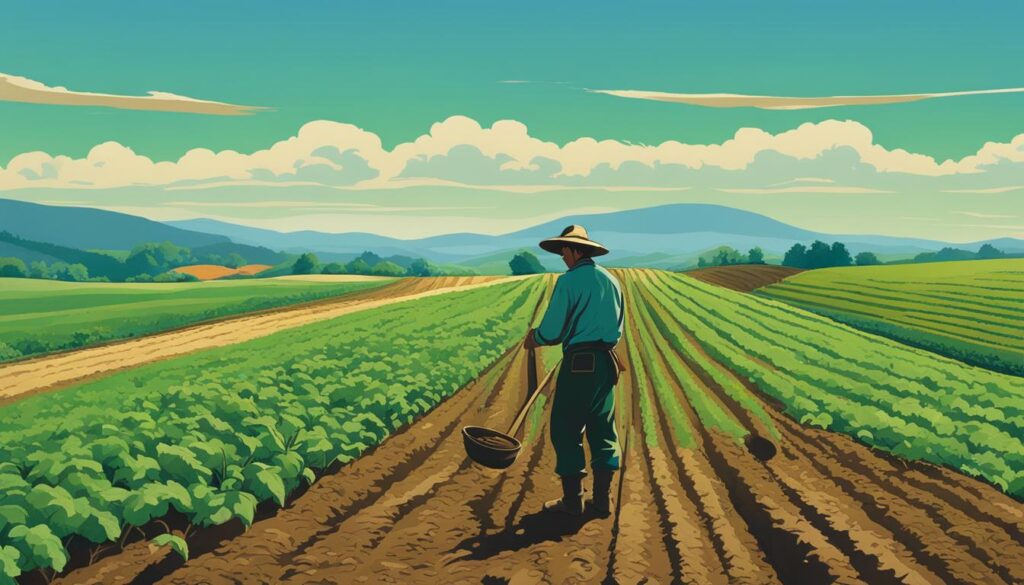As a small-scale farmer, I am passionate about bringing herbs back to the kitchen table and promoting sustainable farming practices. My partner, Kate, and I are dedicated to growing culinary and medicinal herbs, specialty vegetables, and flowers. Our focus has shifted during the pandemic, as we now grow more vegetables and dry herbs for availability during the winter months. We are committed to offsetting overharvesting of endangered species and providing a local source of fresh herbs and vegetables.
To achieve this, we follow organic practices and are constantly experimenting with innovative techniques such as low-till farming and companion planting to attract beneficial insects. Our goal is to cultivate herbs in a way that not only nourishes our bodies but also supports the health of the earth.
Key Takeaways:
- Natural herb farming promotes sustainable farming practices.
- Organic herb cultivation ensures the use of natural methods without synthetic chemicals.
- Low-till farming and companion planting attract beneficial insects and reduce the need for pesticides.
- Growing herbs locally provides a fresh and reliable source of herbs and vegetables.
- Supporting small-scale farmers helps to preserve biodiversity and promote a more equitable food system.
The Nourishing Foods Share: Connecting Farmers with the Community
I am excited to introduce you to the “Nourishing Foods Share” program launched by Adriana and Kate in 2021. This program aims to bridge the gap between farmers and the community by providing fresh, nutritious food while also offering valuable herb gardening tips and advice for organic herb production.
In the Nourishing Foods Share program, Adriana and Kate connect with both seasoned herb farmers and beginners who are interested in growing herbs. They understand that not everyone has the knowledge or resources to cultivate their own herbs, so they take it upon themselves to share their expertise and promote organic herb farming for beginners.
Through the New Entry Food Hub and their CSA program, Adriana and Kate market their produce and reach a wider audience. The Nourishing Foods Share program allows them to directly connect with the community, fostering a sense of trust and transparency in their farming practices. By providing herb gardening tips and advice, they empower individuals to grow their own herbs and partake in sustainable herb farming.
| Nourishing Foods Share Benefits | How to Get Involved |
|---|---|
|
|
Adriana and Kate’s commitment to connecting farmers with the community through the Nourishing Foods Share program is admirable. They believe that everyone should have access to quality food and the knowledge to grow their own herbs. By promoting organic herb farming and providing herb gardening tips, they are empowering individuals and fostering a more sustainable food system.

Testimonial:
“The Nourishing Foods Share program has been a game-changer for me. I’ve always wanted to start my herb garden but didn’t know where to begin. Adriana and Kate’s herb gardening tips and advice have given me the confidence and knowledge to successfully grow my own herbs. I am grateful for their commitment to the community and promoting sustainable farming practices.” – Sarah, program participant
Embracing Sustainable Farming Practices
When it comes to sustainable herb farming, Adriana and Kate are leading the way with their commitment to environmentally friendly practices. They have incorporated various methods to minimize their impact on the land while maximizing the yield of their crops.
Sustainable Herb Farming Methods
One of the key practices they have embraced is low-till farming. Instead of traditional plowing methods that can disrupt the soil structure and contribute to erosion, Adriana and Kate cultivate their fields using hand cultivation methods. By minimizing soil disturbance, they preserve the natural ecosystem and reduce the need for synthetic fertilizers.
In addition to low-till farming, Adriana and Kate have implemented companion planting techniques. They strategically interplant herbs and flowers that attract beneficial insects, such as ladybugs and bees. These insects play a vital role in pollination and pest control, reducing the reliance on harmful pesticides.
Building a Sustainable Farm
Adriana and Kate have also taken steps to build a sustainable farm infrastructure. They have constructed raised beds, which help improve drainage and prevent soil erosion. In addition, they utilize plant-based mulches to enrich the soil and minimize weed growth. These mulches not only provide nutrients but also help retain moisture, reducing the need for excessive watering.
Overall, Adriana and Kate’s commitment to sustainable farming practices goes beyond just growing herbs. They believe that their efforts contribute to a healthier ecosystem and a more resilient agricultural system. By embracing these best practices for growing herbs, they are not only producing high-quality crops but also setting an example for others in the farming community.
| Sustainable Farming Practices | Benefits |
|---|---|
| Low-till farming | Preserves soil structure and reduces erosion |
| Companion planting | Attracts beneficial insects for pollination and pest control |
| Raised beds | Improves drainage and prevents soil erosion |
| Plant-based mulches | Enriches soil, minimizes weed growth, and retains moisture |
“We firmly believe that sustainable farming is essential for the long-term health of our environment and our community. By embracing these practices, we not only protect natural resources but also provide our customers with the highest quality herbs.”
– Adriana and Kate
The Joy of Growing Unique Herb Varieties
Growing herbs naturally is a rewarding and fulfilling experience that allows you to explore a world of unique flavors and health benefits. At our farm, we take joy in cultivating an array of herb varieties that are not commonly found in traditional gardens. These unique herbs not only add depth and complexity to our culinary creations but also offer a range of medicinal properties.
When it comes to herb gardening, there are a few tips that can help you succeed in growing these special varieties. First and foremost, it’s important to start with high-quality seeds or seedlings. This ensures that you have strong and healthy plants from the very beginning. Additionally, providing the right growing conditions is crucial. Most herbs thrive in well-drained soil and require ample sunlight. However, each variety may have specific preferences, so it’s important to research and understand the needs of the herbs you’re growing.
Herbal farming techniques can vary depending on the herb variety and its intended use. Some herbs, such as basil and cilantro, benefit from regular pruning to encourage bushier growth and prevent flowering. On the other hand, herbs like lavender and rosemary prefer to be left untouched, as their woody stems can be sensitive to frequent pruning. It’s important to familiarize yourself with the specific requirements of each herb to ensure successful cultivation.
“The herbs you grow are a reflection of your passion and curiosity as a gardener. Don’t be afraid to experiment with unique varieties and embrace the joy of discovering new flavors and remedies.” – Adriana and Kate
Table: Unique Herb Varieties and Their Benefits
| Herb Variety | Flavor Profile | Health Benefits |
|---|---|---|
| Lemon balm | Citrusy, minty | Calming, digestion support |
| Thai basil | Spicy, licorice-like | Antioxidant, anti-inflammatory |
| Chocolate mint | Rich, chocolatey | Stress relief, digestion aid |
| Golden marjoram | Sweet, floral | Antibacterial, antioxidant |
Growing unique herb varieties not only expands your culinary possibilities but also provides an opportunity to explore the therapeutic benefits of herbs. Whether you’re looking to add a touch of excitement to your dishes or harness the healing properties of herbs, cultivating these unique varieties will surely ignite your passion for herb gardening.

The Vision for a Sustainable Food System
As small-scale farmers committed to sustainable herb farming, Adriana and Kate have a larger vision for the future of food. They believe in creating a more sustainable food system that prioritizes local agriculture and equitable food distribution. By sourcing food from small farms in their community, they aim to support local growers and promote fair pricing for their produce and labor.
One of Adriana and Kate’s goals is to ensure that everyone has access to quality food, regardless of income or resources. They advocate for distributing wholesome, nutrient-dense food to schools, hospitals, food shelters, senior centers, restaurants, grocery stores, and processing facilities. By making fresh, locally grown herbs and vegetables more accessible, they hope to contribute to the overall health and well-being of their community.
The Impact of Local Agriculture
“Supporting local agriculture not only benefits the environment but also strengthens our community,” says Adriana. “When we buy locally, we reduce the carbon footprint associated with long-distance transportation and support the livelihoods of our neighbors.”
In addition to reducing carbon emissions, local agriculture also helps preserve farmland and biodiversity. By supporting small farms like Adriana and Kate’s, consumers play a vital role in preserving fertile land and protecting endangered species. Furthermore, buying locally grown herbs and vegetables fosters a sense of connection and trust between farmers and consumers, creating a more resilient and sustainable food system.
Creating a Sustainable Future
The vision for a sustainable food system goes beyond the boundaries of Adriana and Kate’s farm. They actively engage with their community, sharing their knowledge and expertise to inspire others to embrace sustainable farming practices. Through their website, social media channels, and participation in farmers markets, Adriana and Kate aim to connect with individuals and organizations interested in sustainable herb farming and local agriculture.
Adriana and Kate’s commitment to sustainability is evident in their farming methods and their active role in the community. By promoting sustainable herb farming and advocating for a more equitable food system, they are contributing to a brighter and healthier future for everyone.
Connecting with the Community
As advocates for organic herb cultivation and sustainable herb farming, I believe it is essential to connect with the local community and promote the benefits of local agriculture. Through our website, social media platforms, and participation in farmers markets and events, I actively engage with individuals and organizations interested in sustainable farming practices. By sharing updates and photos from our farm, we aim to create a sense of connection and transparency, allowing people to see firsthand the efforts we put into growing herbs naturally.
Our online presence serves as a platform to educate and inspire others to embrace organic herb cultivation and sustainable farming. We provide information on best practices, offer tips for growing herbs naturally, and showcase the positive impact that local agriculture can have on the environment and community. Through our engagement with the community, we hope to foster a greater appreciation for the value of sustainable herb farming and encourage others to join us in this wholesome approach.

In addition to our online presence, we actively participate in farmers markets and other local events. These opportunities allow us to directly connect with our customers and share the story behind our farm. We engage in conversations about the importance of sustainable herb farming and the benefits of consuming locally grown produce. It is through these personal interactions that we can build trust and strengthen the connection between our farm and the community.
We also welcome inquiries from individuals and organizations who are interested in learning more about sustainable herb farming and local agriculture. By fostering these connections and collaborations, we can work together towards a more sustainable and resilient food system. Whether it’s through partnerships, workshops, or shared resources, we believe that by connecting with the community, we can create a positive impact on the future of herb farming and local agriculture.
The Importance of Organic Certification
When it comes to organic herb production and sustainable herb farming, organic certification plays a vital role in ensuring transparency and trust in the market. While Adriana and Kate, the passionate farmers behind Tilling the Earth, are not certified organic, they strictly adhere to organic practices in their farming methods. Their commitment to sustainability and cultivating herbs without the use of synthetic chemicals is evident in their farming practices.
“Although certification is not required, we believe in the importance of transparency and trust in the organic market,” says Adriana. “By following organic practices, we aim to provide our customers with herbs that are grown in an environmentally friendly and sustainable manner.”
Organic certification not only assures consumers that the herbs they purchase have been grown without the use of harmful chemicals or genetically modified organisms, but it also helps to protect the environment and promotes healthier farming practices. By choosing organic certified herbs, consumers can support sustainable herb farming and contribute to a healthier, pesticide-free ecosystem.
Adriana and Kate’s commitment to sustainable herb farming speaks for itself, even without organic certification. Their dedication to organic practices, coupled with their emphasis on transparency and sustainability, sets them apart in the market. They believe that by prioritizing sustainability and promoting organic practices, they can contribute to a greener and healthier future for herb farming.
Benefits of Organic Certification for Herb Farming
While Adriana and Kate may not be certified organic, there are several benefits to obtaining organic certification for herb farming:
- Market Access: Organic certification provides access to specific markets that exclusively cater to organic products, opening up new opportunities for farmers.
- Consumer Confidence: Organic certification builds trust with consumers, assuring them that the herbs they purchase are grown without synthetic chemicals.
- Promotes Sustainability: Organic certification encourages and promotes sustainable farming practices, benefiting both the environment and farmers.
- Environmental Protection: Organic farming methods minimize the impact on the environment, protecting biodiversity and promoting soil health.
“While we understand the importance of organic certification, our focus has always been on sustainable herb farming and providing our customers with high-quality, naturally grown herbs,” says Kate.
Adriana and Kate’s commitment to sustainable herb farming and organic practices sets an example for herb farmers everywhere. Through their dedication, they showcase the importance of transparency, trust, and sustainability in the organic herb farming industry.
Conclusion
Tilling the Earth: The Wholesome Approach to Natural Herb Farming has been a labor of love, sustainability, and community for me. My commitment to natural herb farming and organic herb cultivation is evident in every aspect of my farming practices. From using sustainable methods to connecting with the local community, I strive to create a brighter and healthier future for everyone.
By prioritizing sustainability, I am able to grow herbs naturally without the use of synthetic chemicals. This not only benefits the environment but also ensures that the herbs I cultivate are of the highest quality. I believe in the power of organic herb cultivation to promote better health and wellbeing.
Throughout this journey, I have embraced the importance of community. Through my website, social media channels, and participation in farmers markets, I actively engage with individuals and organizations who share a passion for sustainable herb farming. Together, we can create a more equitable food system that provides access to natural, organic herbs for all.
